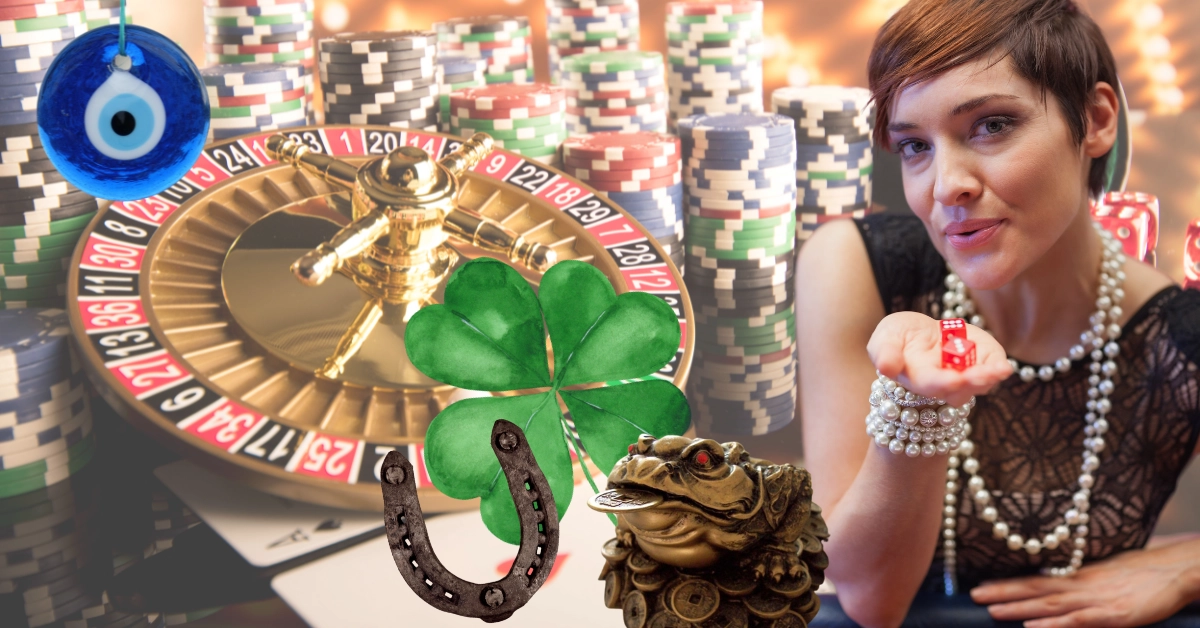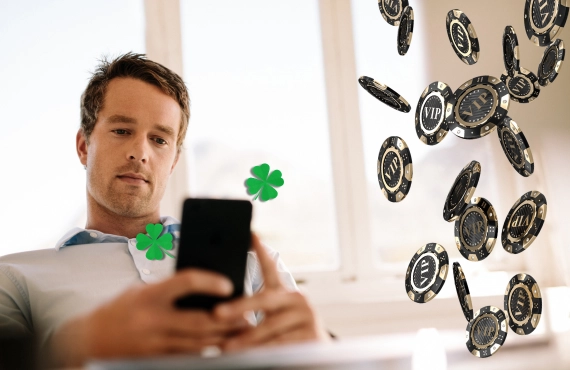Gambling Superstitions from Around the World

Stevie Wonder has a song about superstitions, and he sings it “ain’t the way.” And yet, most people are “very superstitious,” and the song’s message falls on deaf ears, especially when it pertains to gambling.
You either have your own set of superstitions, or they’ve been passed down to you from the generations before. The bad luck that will follow if you walk under a ladder, break a mirror, put a hat on a bed (that one is from my bubbe), and the act of opening an umbrella inside.
But back to gambling and the rituals and omens that players will either bring Lady Luck to them or sink their bankroll. One particular belief is that wearing red will bring you good fortune at tables—especially red underwear. Then there are the lucky charms and ritualistic habits that gamblers around the world think will tilt fortune in their favor.
Gambling superstitions are global—they span cultures and countries, each adding its own set into the casinos. Whether it’s blowing on dice before a roll or carrying a lucky rabbit’s foot in your pocket, these rituals are practiced and praised.
Knowing what these superstitions are isn’t just interesting; it also gives us insight into cultural attitudes toward luck and chance. It adds a fun psychological spin to understanding how some play while also teaching us all about the different ways people try to call luck to their side. So put on your lucky red underwear, and let’s find out about the many gambling superstitions from around the world!
The Role of Superstitions in Gambling
Superstitions have long held an iron grip on the world of gambling—from rituals that gamblers do without fail to bring luck to specific beliefs about numbers and objects, hopefully; these practices have always been rooted in history and human psychology.
Historical Context
These kinds of superstitions in gambling date back centuries, intertwining with cultural practices and beliefs from around the world. Ancient civilizations, like the Chinese and the Greeks, believed in the influence of supernatural forces on luck and chance. In fact, the Chinese have always used lucky numbers and symbols in their gambling activities, a practice that continues to this day.
The origins of gambling superstitions are often linked to broader cultural and religious practices. In many societies, rituals, and symbols believed to bring luck or ward off evil have been integrated into gambling. This historical context shows how these beliefs have been passed down through generations, becoming embedded in gambling culture.
Psychological Aspect
The psychological roots of superstitions have always been connected to the human desire to exert control over uncertain situations. In gambling, where outcomes are determined by chance, superstitions give a certain sense of control and predictability. Psychologists hypothesize that superstitions usually serve as a coping mechanism, helping gamblers manage the anxiety and stress that are associated with unpredictable outcomes.

Believing in superstitions can also create a sense of comfort and confidence, which can influence a gambler’s behavior. For instance, carrying a lucky charm or totem or following a specific routine before placing a bet can boost a gambler’s confidence, potentially impacting their decision-making process. It’s just like athletes who have a “lucky” jersey or pair of socks—it’s a comfort in an uncertain and high-pressure situation.
The Impact on Behavior
Superstitions greatly influence gambling behavior—they can actually dictate how and when gamblers place their bets. Superstitious gamblers develop specific rituals or routines that they believe will increase their chances of winning. These behaviors can range from wearing a particular item of clothing to performing certain actions, like blowing on dice before a roll.
The influence of superstitions on gambling behavior is also evident in the way gamblers interpret their wins and losses.
For example, a gambler who wins after performing a ritual is likely to attribute their success to the superstition, therefore reinforcing the behavior. Conversely, if they lose, they might believe they did not perform the ritual correctly rather than attributing the loss to chance.
The most common gambling superstitions include avoiding the number 13, which is considered unlucky in almost all cultures (not just in gambling), and believing in the luck of a rabbit’s foot. In some cultures, gamblers will avoid entering a casino through the main entrance, believing it will bring bad luck.
Specific behaviors driven by superstitions can also be seen in casino games—in roulette, players might bet on their lucky numbers, while in card games, players might follow a specific sequence of actions they believe will influence the outcome.
Common Gambling Superstitions in Western Cultures
Gambling superstitions are as old as the games themselves, but they weren’t labeled way back then. In Western cultures, the most common ones are as follows:
Lucky and Unlucky Numbers
The number 7 has always been considered “lucky” in Western cultures, and this belief is rooted in several historical and cultural contexts. The Bible references the number 7 multiple times, associating it with completion and perfection. Also, there are seven days in a week and seven wonders of the world, further cementing its status as a number of good fortune. Gamblers frequently seek out the number 7 in games like slots and roulette, hoping its mystical properties will bring them success.
And we all know the number 13 is universally regarded as very unlucky. This superstition is so pervasive that many buildings skip the 13th floor entirely—it doesn’t exist. The fear of 13, known as triskaidekaphobia, can be traced back to religious and historical events, like the Last Supper, where Judas, the betrayer of Jesus, was the 13th guest. In gambling, this superstition manifests in players taking great pains to avoid the number 13 in their bets, believing it always means bad luck!
Rituals and Habits
One of the most recognizable gambling superstitions is blowing on dice before a roll, particularly in games like craps. This ritual is believed to bring good luck and improve the chances of a favorable outcome. The origins of this superstition aren’t clear, but it likely stems from the belief that one’s breath can transfer luck to the dice. Most gamblers perform this practice, finding solace in the ritual regardless of its actual impact on the game’s outcome.
Wearing Red: Belief in Red as a Lucky Color in Casinos
Wearing red for luck, particularly in gambling, is a superstition borrowed from Chinese culture, where red symbolizes good fortune and prosperity. This belief has found its way into Western gambling practices, with players donning red clothing or accessories in hopes of improving their luck at the tables. Casinos, especially those catering to international clientele, also incorporate red into their architecture anddécor to appeal to this particular superstition.
Other Rituals and Habits
- Crossing Your Fingers: This common gesture is believed to bring good luck and protection. Gamblers will cross their fingers before placing a bet or during a game.
- Knocking on Wood: This habit is done to avoid jinxing a good streak and to keep luck on one’s side.
- Avoiding Main Entrances: Some players believe entering a casino through the main entrance brings bad luck and will enter through side or rear entrances instead.
- Counting Money: It is considered bad luck to count money while still at the table, as it is believed to bring future losses.
Objects and Symbols
The rabbit’s foot is perhaps one of the most well-known lucky charms in Western culture. This superstition dates back to ancient Celtic tribes who believed that rabbits, being burrowing animals, could communicate with the gods and the underworld. Carrying a rabbit’s foot was thought to confer protection and good luck. Even today, some gamblers keep a rabbit’s foot as a talisman.
Four-Leaf Clover: Symbol of Good Luck and Fortune
The four-leaf clover is another powerful symbol of luck, deeply rooted in Western folklore. Each leaf is said to represent faith, hope, love, and luck. Finding a four-leaf clover is super rare, and thus it is considered a sign of imminent good fortune. Gamblers might carry a clover or a representation of it, believing it will up their chances of winning.
- Horseshoes: Often hung above doorways or carried, horseshoes are believed to bring good luck and protect against evil spirits.
- Lucky Coins: Some gamblers carry a special coin, sometimes a silver dollar, which they believe will bring them good luck.
- Mojo Bags: Originating from voodoo practices, mojo bags filled with herbs and charms are believed to protect and bring luck.
- $50 Bills: In Las Vegas, it is considered unlucky to carry or be paid in $50 bills, a belief that dates back to mob activities in the gambling Mecca.
Superstitions in Asian Cultures
Different cultures have different superstitions, but they all occupy an important space—and in Asian cultures, these beliefs influence behaviors, rituals, and the entire approach to gambling.
Chinese Superstitions
In Chinese culture, certain numbers are particularly auspicious. The number 8 is highly favored because its pronunciation sounds like the word for “wealth” or “prosper” (发, pronounced “fa”). This preference extends to phone numbers, license plates, and addresses containing 8. The number 9, associated with longevity and eternity, is also considered very lucky and is often used in ceremonies and rituals to bring long-lasting fortune.
Feng Shui: Arrangement and Placement for Luck
Feng Shui, which is the ancient Chinese art of placement, is used to design and encourage harmonious and prosperous environments. In gambling, Feng Shui principles guide the arrangement of items and furniture for good luck. Placing lucky charms strategically or avoiding objects associated with bad luck, like the number 4 (which sounds like the word for death), can influence gamblers’ confidence and perceived luck.
Less Common Chinese Superstitions
- Avoiding Books: The word for “book” sounds like “lose” in Chinese, making books considered unlucky. Gamblers avoid bringing books to the casino or even talking about them while gambling.
- Washing Hands: Chinese gamblers believe washing hands during a losing streak can wash away bad luck. And they avoid washing hands if they are on a winning streak to not “wash away” their good fortune.
- Feeding the Baby Ghost: Some Chinese gamblers believe feeding sugar to an invisible “baby ghost” at the table can bring good luck.
Japanese Superstitions
The Maneki-Neko, or beckoning cat, is a very popular symbol in Japan that is believed to bring good fortune. It’s seen in businesses, including casinos, and this figurine depicts a cat with an upright paw (sometimes it is moving up and down, appearing to wave), inviting prosperity and luck. The left paw raised is thought to attract customers, while the right paw brings wealth and success.
Avoiding the Number 4: Associated with Death
Similar to Chinese beliefs, the number 4 is extremely unlucky in Japan because it sounds like the word for death (死, pronounced “shi”). This superstition leads to the total avoidance of the number in most contexts, including gambling. Casinos and game organizers will skip the number 4 in betting options, and gamblers will avoid it when placing their bets to steer clear of bad luck.
Indian Superstitions
In India, Diwali, the festival of lights, is considered to be an auspicious time for gambling. The tradition dates back to ancient times when people believed that playing games of chance during Diwali would invite prosperity and good luck for the coming year. Families and friends usually get together to play card games, reinforcing the cultural significance of luck and fortune during this festive period.
Touching Money: Rituals Before Playing
In Indian culture, touching money to certain objects or performing specific rituals before gambling is believed to bring good luck. One common practice is to touch money on religious idols or pictures of deities to invoke blessings. This ritual is thought to purify the money and bring prosperity to the gambler—hopefully, a favorable outcome in their games.
Superstitions in European Cultures
European cultures also have their own gambling superstitions, and they’re less on the supernatural side (seriously, a “baby ghost” sounds like a horror movie). Let’s hop over the pond and see what the Brits fear, shall we?
British Superstitions
In British culture, crossing one’s fingers is a widely recognized gesture for wishing good luck. This superstition dates back to pre-Christian times when it was believed that spirits resided at the intersection of a cross. By crossing their fingers, people hoped to trap these spirits and invoke their protection and blessings. Okay, we didn’t know this, and it may be creepier than the baby ghost thing?
Carrying a Coin: Belief in Attracting Fortune
Another common British superstition is just carrying a lucky coin around. This practice stems from the belief that certain objects can attract good fortune, and gamblers keep a special coin on their person, sometimes one with personal significance or historical value, to bring them luck at the tables.
Wishing Others Good Luck
In Britain, it is common to wish others good luck, which is believed to create a positive atmosphere and attract fortune. This practice is based on the principle of karma, where spreading good wishes is thought to bring good fortune in return.
Italian Superstitions
In Italy, the “corna” or horned hand gesture is used to ward off bad luck and evil spirits. This gesture, made by extending the index and little fingers while keeping the others folded, is especially popular among gamblers, as it is believed to protect against the “malocchio” or evil eye, which can bring misfortune.
Avoiding Unlucky Days: Specific Days Considered to Be Bad Luck
Italians are also super cautious about certain days of the week, which are thought to be very unlucky for gambling. For instance, Friday the 17th is seen as particularly inauspicious, and a majority of Italians will avoid major decisions or activities, including gambling, on this day. Mamma Mia!
Spanish Superstitions
In Spain, touching wood is a common practice to bring good luck and prevent bad luck. This superstition is believed to have originated from ancient times when people thought that spirits and gods lived in trees. By touching wood, gamblers hope to invoke the protection of these spirits and ensure a successful outcome.
Throwing Salt: A Remedy for Bad Luck
Throwing salt over one’s shoulder is another well-known Spanish superstition (we thought this was an Italian one—we learned something new). This practice is believed to ward off bad luck and evil spirits. The origin of this superstition dates back to Roman times when salt was a valuable commodity, and spilling it was considered a really bad omen. By throwing a pinch of spilled salt over the left shoulder, gamblers hope to reverse their bad luck and protect themselves from negative influences.
Superstitions in American Cultures
Superstitions have been part of American culture for centuries—they are a mix of beliefs and fears from different cultures that are handed down from generation to generation, turning them into traditions. No matter what they are, they influence our behavior, especially in the context of gambling, where luck is the most important thing!
Native American Superstitions
Dream catchers, which originated from the Ojibwa tribe, are crafted from willow hoops woven into webs, adorned with feathers and beads. Traditionally hung above beds, they are believed to catch bad dreams and let good ones pass through. This protective symbolism extends to gamblers, some of whom use dream catchers to guard against misfortune and attract positive energy.
Totem Animals for Guidance and Luck
Totem animals hold great importance in Native American spirituality, serving as spiritual guides that offer wisdom, protection, and strength. Each animal represents specific traits, like the eagle for leadership and the wolf for loyalty. Gamblers can invoke these animals through rituals or carry their symbols to get guidance and a little luck.
African American Superstitions
Mojo bags, or gris-gris bags, are small pouches filled with herbs, stones, and other items believed to bring good luck and protection. Rooted in African traditions and adopted by African American communities, these bags are commonly carried by gamblers to attract luck and ward off negative energies. Each bag is personalized with items that are associated with the individual’s wants and desires.
Ritual Cleansing: Prepping for Gambling
Ritual cleansing involves using specific herbs and natural elements in a bath or washing to purify oneself before gambling. This practice is believed to remove negative energies and improve the chances of success by starting the game with a clean slate and a positive mindset!
Modern Superstitions and Urban Legends
Superstitions and urban legends have always been part of gambling culture, and in the modern age, these beliefs have grown to include certain myths surrounding the technology of online gambling and casino apps. Are contemporary superstitions and urban legends really influencing gamblers? You bet they are!
Technology and Online Gambling
Since the invention of online gambling, a whole new slew of superstitions have hit the scene around the software and algorithms used by virtual casinos. A lot of gamblers truly believe that certain algorithms or games are inherently luckier than others. This belief stems from the idea that some software might be rigged to pay out more frequently or at specific times. Despite these claims, there is zero evidence to support such theories (unless you are playing at a shady or unregulated casino). All reputable online casinos use random number generators (RNGs) to guarantee fair play, and these RNGs are regularly audited by independent agencies to verify their integrity.
Rituals for Good Luck: Practices Before Logging In to a Casino App to Play
Just like gamblers walking into physical casinos (through a side door, of course) have their rituals, online gamblers have their own practices to call out to luck before logging into their chosen casino app.
Some players will perform specific routines:
- Like wearing a particular piece of clothing.
- Logging in at a specific time of day.
- or reciting their very own good luck mantra.
These rituals are all different and personal, but they all serve the same purpose—to boost the player’s confidence and create a sense of control over the super-unpredictable outcomes of online gambling.
Casino Urban Legends
You thought urban legends were just stories you heard about that one house in your neighborhood where a witch lived? Wrong! There’s a common urban legend in the casino world that some slot machines are actually cursed.
How so? Well, these are the machines that gamblers say bring bad luck, and it’s based on anecdotal experiences of consistent losses. These tales then circulate like a game of telephone about specific slots that never pay out or are said to be “cold” for long periods of time. Some players avoid these machines altogether, while some brave, un-superstitious souls seek them out, hoping they’ll be the ones to break the curse, which plays into the gambler’s fallacy, where players think that a machine that has not paid out for a long time is due for a win.
Legendary Lucky Streaks
On the lucky side of the coin, there are tales of legendary lucky streaks that are equally pervasive but not verifiable. These stories tell of gamblers who experience a series of improbable wins, leading to huge payouts, and the causes of these streaks are attributed to superstitions, like wearing a lucky item of clothing, sitting in a particular chair, or following a strict betting pattern. These stories are whispered down the lane and grow bigger every time they’re repeated. One example is the unverified story of a gambler who won millions after changing seats, perpetuating the belief that certain simple actions can influence luck.
Bally’s Las Vegas
Formerly known as the MGM Grand, then as Bally’s Las Vegas, and now rebranded as the Horseshoe Las Vegas, it is another casino with a spooky, haunted reputation. In 1980, a devastating fire at the MGM Grand claimed 85 lives, and many believe that the spirits of those who perished still haunt the hotel. Guests have reported seeing apparitions, hearing voices, and feeling sudden drops in temperature. The tragic history of the fire, coupled with these ghostly encounters, has cemented Bally’s as a site of numerous paranormal legends.
True Stories and Myths
Houses aren’t the only things that are haunted—supposedly, the Luxor Hotel in Las Vegas is a cursed casino. Known for its distinctive pyramid shape, the Luxor has been the site of numerous tragic events, including accidents and suicides, which have fueled stories of paranormal activity.
Guests and staff have reported seeing ghosts, hearing strange noises, and experiencing unexplainable phenomena. One of the most notorious hauntings involves a blonde woman who appears in guests’ dreams and allegedly strangles them. Other stories include mysterious banging noises and shadowy figures that move quickly out of sight. These tales contribute to the Luxor’s reputation as one of the most haunted places in Las Vegas (we won’t be visited there, no thank you).
Debunking Superstitions
Superstitions have long influenced gambling behavior, but we need to talk about the actual science and psychology behind these old wives’ tales! It’s time to debunk some of the most common gambling superstitions with some help from experts in the field.
Scientific Perspective
Gambling outcomes are primarily governed by probability and odds—games of chance like roulette, slot machines, and craps all rely on random processes. Yes, the “house edge” means that casinos will always have a slight advantage, designed to make sure they turn a profit in the long run.
For example, slot machines usually have a house edge ranging from 5% to 10%, while games like blackjack have a lower edge, around 1%. Understanding these probabilities explains the randomness of gambling and emphasizes that winning and losing are governed by mathematical realities, not superstitions.
Probability theory, a branch of mathematics, also helps us quantify the likelihood of different outcomes. It teaches us that each event in a game of chance is independent of previous events—if a coin lands on heads multiple times in a row, it doesn’t increase the likelihood of tails appearing next. This misconception is known as the gambler’s fallacy and wrongly leads people to believe that certain outcomes are “due” based on past events, which is scientifically incorrect.
The expected value is another critical concept derived from probability—it represents the average outcome of a bet if the same bet was placed many times. By understanding expected value, gamblers can better assess the potential risks and rewards of their betting choices. In a game with a high house edge, the expected value for the player is negative, meaning they are likely to lose money over time.
Psychological Comfort: Understanding the Placebo Effect of Superstitions
Superstitions provide psychological comfort to gamblers—they act as coping mechanisms to lessen anxiety and boost confidence. It’s a placebo effect that can make gamblers feel more in control of their fate, and rituals like rubbing a rabbit’s foot or performing specific routines before gambling can improve a player’s confidence and overall experience, even if they don’t influence the game’s outcomes. This psychological comfort is rooted in the human desire to find patterns and exert control over uncertain situations.
Psychologists have studied the effects of superstitions on performance and found that while they may not change the outcomes of games, they can influence the behavior and mindset of gamblers. This psychological boost, however, is purely a result of the placebo effect and not a genuine influence on the randomness of the games.
Expert Opinions
Professional gamblers rely on skill and strategy rather than superstitions, but they still acknowledge that they can give some psychological comfort, but know they don’t impact the mathematical probabilities of the games.
Phil Hellmuth, a professional poker player, has said, “Poker is not about luck; it’s about strategy and reading people.”
Daniel Negreanu, another pro poker player, stresses the importance of understanding odds and keeping a clear mind rather than depending on any lucky charms or rituals.
Luke Clark of the University of Cambridge’s Department of Experimental Psychiatry notes that “high impulsivity can predispose a range of more complex distortions—such as superstitions—that gamblers often experience.” This statement underlines that superstitions are more prevalent among more impulsive gamblers who may not fully grasp the underlying probabilities of the games they play.
Casino Industry Stance: How Casinos See and Handle Superstitions
Casinos are well aware of the superstitions held by many of their patrons, and while they don’t exactly discourage these beliefs, they do make sure that the games are fair and based on random outcomes. Casinos use random number generators (RNGs) in electronic games to guarantee fairness and unpredictability, which are tested and audited by independent organizations to maintain their integrity.
Casinos actually benefit from superstitions—they tend to improve gameplay for players, making them much more likely to keep playing. Not to be outdone by unfounded myths, casinos also use superstitions to their advantage via their marketing strategies. Some casinos in Asia incorporate elements of Feng Shui in their design, believing that these elements will attract more players who believe in this particular superstition. Similarly, casinos will host events or promotions on days considered lucky, such as the 8th day of the 8th month, to draw in those superstitious players.
Understanding the science behind gambling and the psychology of superstitions can help players make better decisions. And while superstitions can put people at ease, they in no way influence the mathematical realities of gambling. Sure, bring your lucky coin along, but focus on probability and skill, have a solid understanding of your chances, and gamble responsibly. Don’t get in over your head because you believe your “lucky” red underpants will help you win big!
Conclusion
Still superstitious? That’s okay; we all are! Just remember that folklore or parables won’t determine the outcome at the blackjack table—either good or bad. Gambling outcomes are always random, no matter which casino entrance you use or how many times you knock on wood when logging into a casino app.
Here’s a quick recap of everything we talked about!
- Historical Context: Gambling superstitions date back centuries and are rooted in cultural and religious practices from around the world, including ancient Chinese and Greek civilizations.
- Psychological Aspect: Superstitions provide psychological comfort, acting as coping mechanisms to reduce anxiety and boost confidence, creating a placebo effect.
- Impact on Behavior: Superstitions dictate how and when gamblers place their bets, influencing behaviors through rituals and habits, such as blowing on dice or avoiding the number 13.
- Common Superstitions in Western Cultures: Include beliefs in lucky numbers like 7 and unlucky ones like 13, rituals like wearing red, crossing fingers, and carrying lucky charms like rabbit’s feet and four-leaf clovers.
- Superstitions in Asian Cultures: Chinese beliefs in auspicious numbers like 8 and Feng Shui, Japanese symbols like the Maneki-Neko, and Indian practices during Diwali and rituals involving touching money to idols.
- Superstitions in European Cultures: British practices like crossing fingers and carrying coins, Italian gestures like the horned hand to ward off evil, and Spanish rituals like touching wood and throwing salt.
- Superstitions in American Cultures: Native American symbols like dream catchers and totem animals, and African American practices involving mojo bags and ritual cleansing.
- Modern Superstitions and Urban Legends: New superstitions have emerged with online gambling, including beliefs in lucky algorithms and rituals performed before logging into casino apps. Urban legends about cursed machines and haunted casinos like the Luxor and Horseshoe Las Vegas continue to be talked about among gamblers.
- Debunking Superstitions: Gambling outcomes are governed by probability and odds. Understanding these concepts and superstitions’ psychological aspects can help players make more informed decisions. Expert opinions from professional gamblers emphasize skill and strategy over superstitions. Casinos guarantee fairness through the use of random number generators (RNGs)—but they do leverage superstitions in their marketing strategies.
Final Thoughts
Gambling superstitions, while lacking any scientific validity, do add cultural and entertainment value to gambling! They reflect the human need to find patterns and exert some kind of control over random outcomes. By understanding the science behind gambling and the role superstitions play, we can enjoy the ride responsibly by making smart choices.
Are you a superstitious gambler? Tell us if you have a ritual or lucky totem that you swear by and how it influences your gameplay! We always want to hear a different perspective, so join the conversation and let us know your thoughts!

Alyssa contributes sportsbook/online casino reviews, but she also stays on top of any industry news, precisely that of the sports betting market. She’s been an avid sports bettor for many years and has experienced success in growing her bankroll by striking when the iron was hot. In particular, she loves betting on football and basketball at the professional and college levels.








